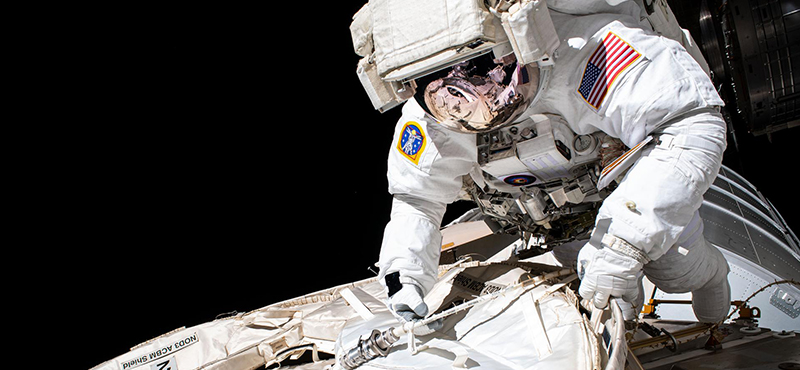The problem
As humanity looks to expand its presence beyond Earth, the wellbeing of the women and men who undertake off-planet activities remains top priority. With space missions likely to become longer over coming years, developing reliable ways to monitor the health of astronauts is a crucial aspect of space exploration. So, how do we do it?
The solution
UniSA is home to the South Australian Node of the Australian National Fabrication Facility (ANFF-SA), and node director, UniSA’s Associate Professor Craig Priest, is currently working with NASA to develop wearable sensors to provide real time information about the health of astronauts.
Together, ANFF-SA and NASA aim to develop sensors to monitor health through the testing of bodily fluids such as sweat and saliva. The “wearable” technology would identify potential health issues quickly and easily.
Assoc Prof Priest says the partnership is an example of “the very first fruits of return on investment” for Australia’s rebooted space industry, harnessing exciting nanotechnology and microfluidics research at the UniSA Mawson Lakes campus.
“When you are working and travelling in space there is no doctor on board or regular health testing facilities and we know astronauts are operating in a challenging environment,” Assoc Prof Priest says.
“You can imagine in a space environment where you’ve got zero gravity, radiation and other extreme conditions, the ability to know if things are going wrong quickly is very important.
“We are working with NASA to develop non-invasive health self-assessment – and possibly wearable – tools that will be able to analyse things like sweat and saliva and track health effects in real time.
“The research supports ambitions for further and longer journeys into space and will help astronauts to monitor and mitigate the physiological effects of longer exposure to space environments.”

Assoc Prof Priest says the technologies developed with NASA would ultimately also be used for applications on Earth.
“Increasingly health management is going to go towards looking for those early signs so we hope that some of these sensors will be able to head off health challenges quite quickly,” he says.
“Whatever technologies are developed in this area of research are eventually going to find their way into our pockets or onto our wrists and it’s those types of technologies that I believe are going to be the game changers for health management and early intervention in space and on Earth.”
Dr Félix Miranda is Deputy Chief, Communications and Intelligent Systems Division, at NASA’s Glenn Research Center, and says the collaboration with UniSA and ANFF-SA brings together researchers with different strengths in highly specialised fields, providing a unique opportunity for international collaboration.
“The core of the work with Associate Professor Priest and his team at the University of South Australia node of the ANFF is based on conducting fundamental research on the physical and electrical properties of advanced nanomaterials, aimed at the development of novel sensors for biological and health monitoring applications.
“Under the agreement, the involved organisations have been able to leverage their respective strengths to perform fundamental research to advance nanotechnology-based sensing capabilities in micro-fluidics enabled photonic sensors for health monitoring applications in space platforms. The combined expertise and capabilities comprised in this effort have been beneficial in addressing problems of mutual scientific interests to our respective organizations, which could open the doors for further collaborations in this area, as well as other related areas of interest.
Dr Félix Miranda
Deputy Chief, Communications and Intelligent Systems Division, NASA
Disclaimer of Endorsement: Neither the U.S. Government nor NASA endorse or recommend any commercial products, processes, or services. Factual statements made do not constitute or imply endorsement, recommendation, or favouring by the U.S. Government or NASA.
Partners involved

Related services
Contact the Enterprise Hub
Get in touch with us to find out how we can support your business needs.
Make an enquiry online or call us to discuss your idea


